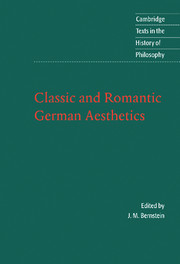Book contents
- Frontmatter
- Contents
- Introduction
- Chronology
- Further reading
- Note on the texts
- Aesthetica in nuce: A Rhapsody in Cabbalistic Prose (1762)
- Laocoön: An Essay on the Limits of Painting and Poetry (1766)
- From ‘On the Artistic Imitation of the Beautiful’ (1788)
- ‘Kallias or Concerning Beauty : Letters to Gottfried Körner’ (1793)
- ‘Oldest Programme for a System of German Idealism’ (1796)
- ‘Letter to Hegel, 26 January 1795’
- ‘Being Judgement Possibility’ (1795)
- ‘The Significance of Tragedy’ (1802)
- ‘Remarks on Oedipus’ (1803)
- From Miscellaneous Remarks (1797)
- ‘Monologue’
- ‘Dialogues’ (1798)
- ‘On Goethe’ (1798)
- ‘Studies in the Visual Arts’ (1799)
- From ‘Critical Fragments’ (1797)
- From ‘Athenaeum Fragments’ (1798)
- From ‘Ideas’ (1800)
- ‘On Goethe's Meister’ (1798)
- ‘Letter About the Novel’ (1799)
- ‘On Incomprehensibility’ (1800)
- Index
- Cambridge texts in the history of philosophy
‘Studies in the Visual Arts’ (1799)
Published online by Cambridge University Press: 05 June 2012
- Frontmatter
- Contents
- Introduction
- Chronology
- Further reading
- Note on the texts
- Aesthetica in nuce: A Rhapsody in Cabbalistic Prose (1762)
- Laocoön: An Essay on the Limits of Painting and Poetry (1766)
- From ‘On the Artistic Imitation of the Beautiful’ (1788)
- ‘Kallias or Concerning Beauty : Letters to Gottfried Körner’ (1793)
- ‘Oldest Programme for a System of German Idealism’ (1796)
- ‘Letter to Hegel, 26 January 1795’
- ‘Being Judgement Possibility’ (1795)
- ‘The Significance of Tragedy’ (1802)
- ‘Remarks on Oedipus’ (1803)
- From Miscellaneous Remarks (1797)
- ‘Monologue’
- ‘Dialogues’ (1798)
- ‘On Goethe’ (1798)
- ‘Studies in the Visual Arts’ (1799)
- From ‘Critical Fragments’ (1797)
- From ‘Athenaeum Fragments’ (1798)
- From ‘Ideas’ (1800)
- ‘On Goethe's Meister’ (1798)
- ‘Letter About the Novel’ (1799)
- ‘On Incomprehensibility’ (1800)
- Index
- Cambridge texts in the history of philosophy
Summary
475. On the sensations of thinking in the body.
476. Ancients. The Madonna./Man is a self-endowed historical individual. Stages of mankind. When mankind has reached the highest stage, the higher will reveal and conceal itself spontaneously./Aspect of the history of mankind – the masses – nations – societies – individuals./Elevation of mechanics. Fichte's intellectual chemistry. Chemistry is the passionate ground. Chemistry is the crudest and first formation./Descriptions of paintings etc./On Landscape painting – and painting against sculpture in general./Everything must be amenable to being mathematically squared and resistant to being squared at the same time. Use, practice is infinitely graded – so is measurement. Landscapes – Surfaces – Structures – Architectonic. Cavernous Landscapes. Atmospheres. Cloudlandscapes. The entire landscape should form An Individual – Vegetation and inorganic nature – Fluid Firm – Masculine – Feminine. geognostic Landscapes. Nature Variations./Must not sculpture and painting be symbolic. The picture gallery is a store-room for every kind of indirect stimulus for the poet./Necessity of all works of art./Every work of art has an Ideal a priori – has a necessity within itself to be there. Only this way is a true criticism of painters possible. Suite of madonnas. Suite of heroes. Suite of wise men. Suite of geniuses. Suite of gods. Suite of men. We are compelled by the ancients to treat them as holy relics. Particular kinds of souls and spirits. Who dwell in trees, landscapes, stones and paintings. A landscape must be looked at as a dryad or an oread. A landscape must be felt like a body. Every landscape is an ideal body for a particular kind of spirit./The Sonnet./The Joke./Feeling for Antiquity – roused by the Ancients.
- Type
- Chapter
- Information
- Classic and Romantic German Aesthetics , pp. 235 - 238Publisher: Cambridge University PressPrint publication year: 2002

